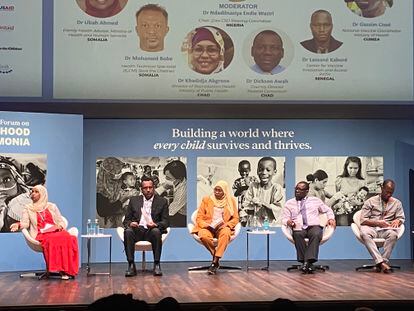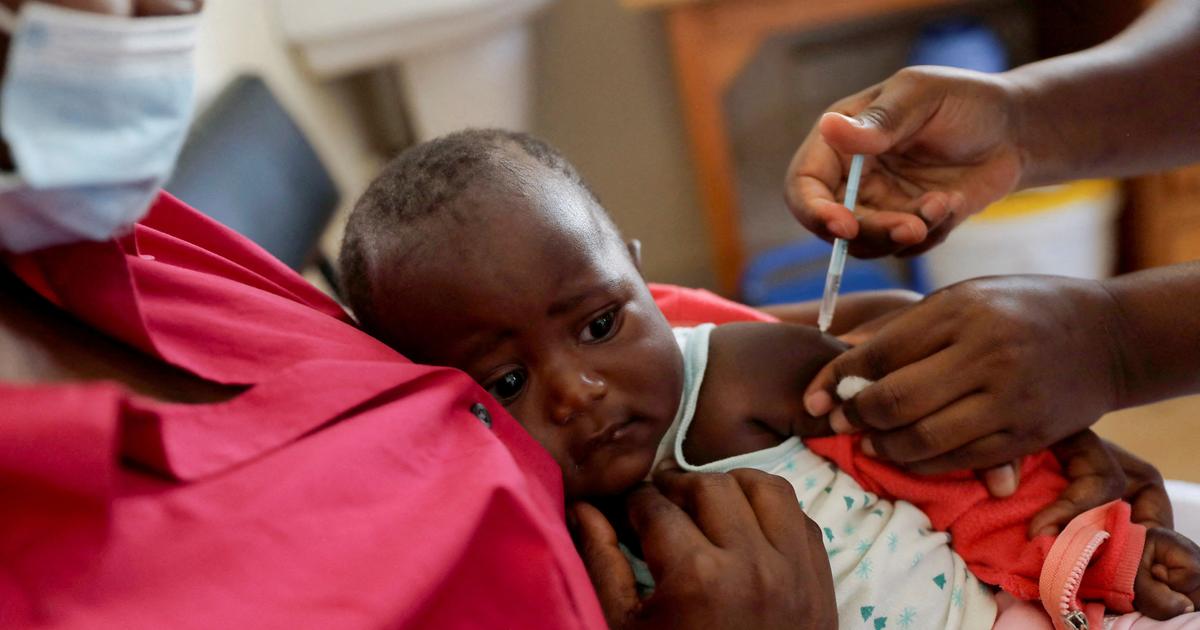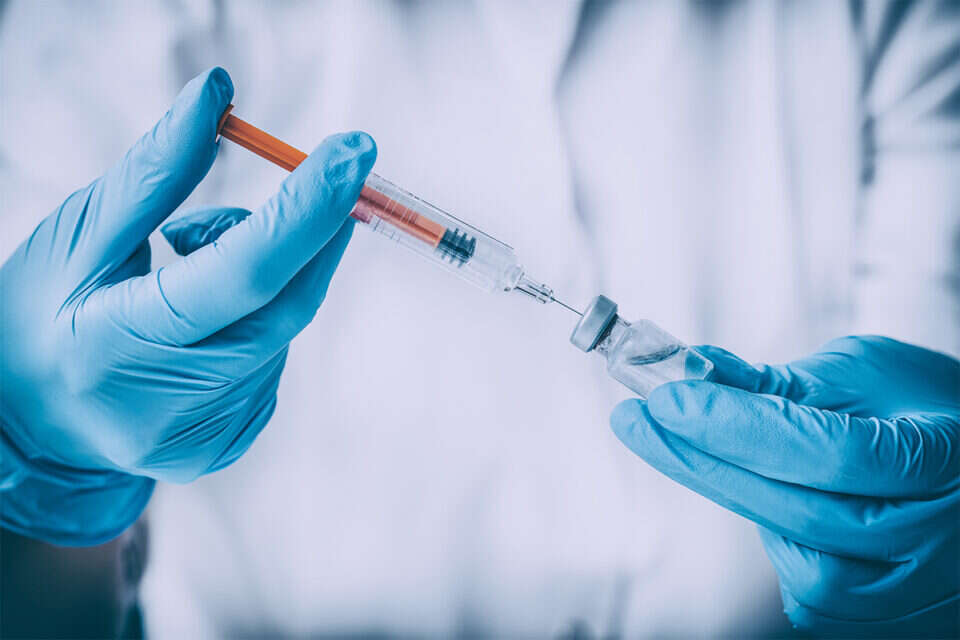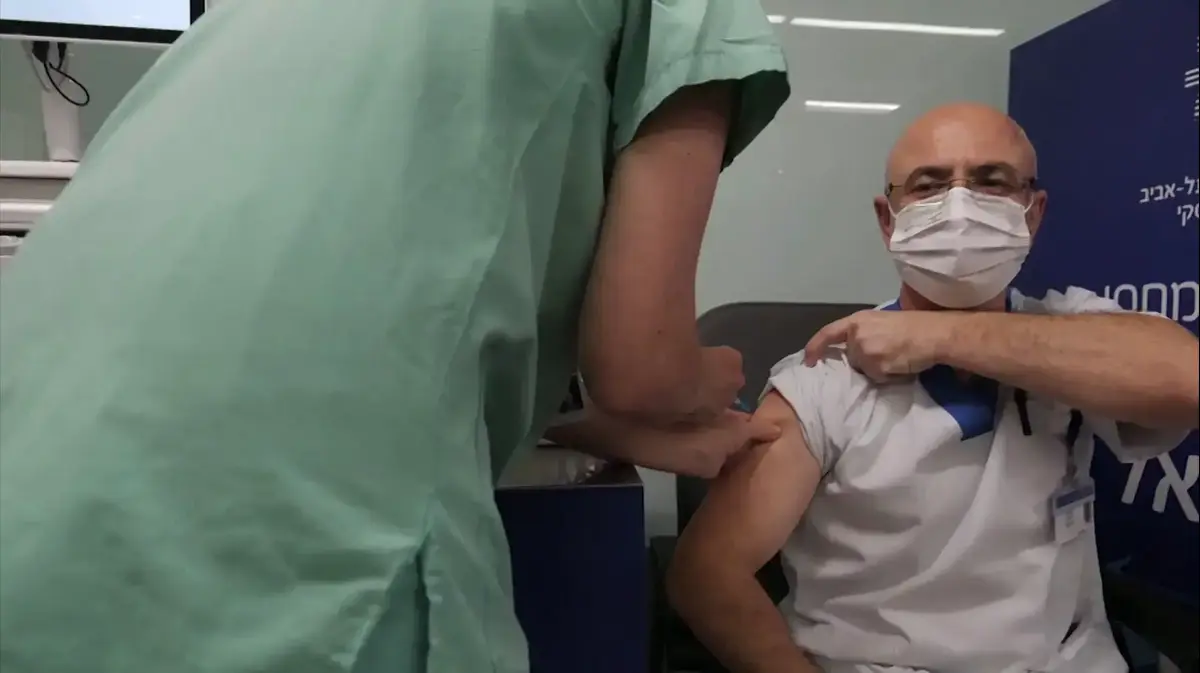A road, a truck, reliable electricity, a social worker who speaks the local dialect, a respite for a few hours.
The reasons that separate a child from a vaccine that can save his life are often unsuspected.
In 2021, the number of children without any type of immunization increased and reached 18.2 million.
In 2020 there were 16.5 million and in 2019 13.3, according to the latest Unicef report.
International organizations and governments call these children “zero doses” and the goal of the international community is that by 2030 they only represent 6.6 million, that is, half that of 2019.
Reaching these children, immunizing them and avoiding a large number of child deaths is one of the commitments adopted at the Global Forum on Childhood Pneumonia that was held this week in Madrid.
The meeting was organized, among others, by the 'La Caixa' Foundation, the Bill and Melinda Gates Foundation, Unicef, the Vaccine Alliance (Gavi), the Barcelona Institute for Global Health (ISGlobal) and organizations such as Médicos Sin Borders or Save the Children.
Governments, companies and representatives of civil society have also participated in the forum.
More information
Global confidence in vaccines falls due to the pandemic, which leaves 67 million children unimmunized
“Zero dose children was not an active policy in the Vaccine Alliance until about five years ago.
But, after having achieved adequate vaccination coverage in the last two decades and having halved child mortality from preventable diseases, we now see that this part of the population represents a very high risk.
And covid-19 has aggravated the situation”, Rafael Vilasanjuan, member of the Gavi Management Committee and director of analysis and development at the Barcelona Institute for Global Health (ISGlobal) told this newspaper.
Of the 18 million children who did not receive any vaccines in 2021, half live in six countries: India, Nigeria, Indonesia, Ethiopia, the Philippines and the Democratic Republic of Congo.
Zero dose children are identified using the three doses against diphtheria, tetanus and whooping cough (DPT3) as a marker, because the child who has not received this basic immunization has not benefited from any other, such as those that prevent pneumonia, leading cause of infant death with more than 700,000 deaths of children under five each year.
Where are the children zero dose?
Of the 18 million who did not receive any vaccine in 2021, half live in six countries: India (2.7 million), Nigeria (2.2), Indonesia (1.1), Ethiopia (1.1), Philippines ( 1 million) and the Democratic Republic of the Congo (700,000).
They are boys who are in conflict zones, very impoverished and far from government health services.
Among them there are also highly mobile populations: nomads, displaced persons or refugees.
The Hospital Route
The strategies to reach them are diverse.
Recently, in Ogun State, in the southwest of Nigeria, a road that is still under construction has been able to bring 30 communities closer to a health center that found it very difficult to travel to the place, especially in the rainy season.
The highway is called the Hospital Route and on vaccination days there is already a waiting line, Gavi congratulates himself.
We have to make a titanic effort.
In Nigeria, eight million children are born each year, two million of whom do not receive any dose.
Cristian Munduate (Unicef)
"We cannot abandon any child, they are little ones who already live in the midst of so many difficulties... I have hope in the new Nigerian government (which takes office at the end of May) so that the policies speed up", he confided to This newspaper Chizoba Wonodi, director of the International Center for Vaccine Access at the Johns Hopkins Bloomberg School of Public Health in Nairobi (Kenya).
In Nigeria, with a population of at least 220 million people, more than 40% of children are not fully vaccinated.
At the forum held in Madrid, the authorities of this country promised to reduce children with zero doses by 30%.
“We have to make a titanic effort.
In Nigeria, eight million children are born each year, two million of whom do not receive any dose.
We do sweeps, we try to get cheaper vaccines, we support the Government in vaccination and as soon as the new Executive takes office we are not going to waste time and we are going to ask him to speed up and increase the commitment in primary health care, which is key ”, he explained to this newspaper Cristian Munduate, representative of Unicef in the African country.
Participants in the Second Global Pneumonia Forum, held on April 26 and 27, 2023 at CaixaForum MadridBeatriz Lecumberri
According to Vilasanjuan, from Gavi, a child does not receive any vaccine, either by chance (that is, because the services do not arrive), or by will.
“For example, in a conflict zone they try to prevent these services from reaching the enemy zone.
In the English-speaking area of Cameroon there are many zero doses because the Government does not enter and it is very difficult for these services to reach them, ”he quotes.
Shiferaw Dechasa Demissie, one of the representatives of the International Rescue Committee at the Madrid forum, regrets that the World Health Organization (WHO) establishes that children under two years of age must be reached "although in the Horn of Africa, in Ethiopia , Somalia, South Sudan and Sudan there are children of four or five years who have not received a single dose of vaccine.
The coronavirus pandemic, which has concentrated the vast majority of health resources and has forced millions of people to confine themselves, has caused unimmunized children to increase, and these little ones are now over two years old.
“We are also seeing boys who come from conflict zones, from remote places controlled by violent groups where no health service reaches.
We are negotiating with governments and with Gavi to convince them to extend their scope to children as young as five.
That's why I'm on this forum.
But when they accept, the necessary resources are not available either, so we have to continue negotiating.
This is not just health, we are talking about basic human rights, ”he told this newspaper.
"Where no one else arrives"
Gavi has committed to committing $100 million to the Zero Dose Immunization Program (ZIP).
Adetokunbo Oshin, director of the organization for high-impact countries (that is, in crisis situations), "the objective is to offer equality to all children and to help especially countries that are so far behind such as Somalia, Chad, South Sudan , in which there is no, for example, the pneumonia vaccine”.
We need another model, because the current one does not work
Rafael Vilasanjuan, Gavi and ISGlobal
“When you discover that there is a significant bag of unvaccinated children, the framework of action would have to be expanded, but first we have to have the capacity to reach those places,” Vilasanjuan qualifies.
And for this it is necessary, he stresses, to intervene in the entire vaccination chain.
“We need another model, because the current one is useless.
And here comes what is called the work of the last mile: small local organizations.
It is very difficult to coordinate them, but, at the same time, they are absolutely necessary so that these children do not run out of vaccines.
It is an enormous job, but essential”, assures the expert.
“Small organizations must be identified and strengthened to carry out this task and guarantee the logistics chain of the vaccine.
We are talking about actors who do not have a great relationship with governments,
In addition to the distances and conflicts, these local actors also work in places where there is insufficient trust in health services and in vaccines, which according to Unicef save some 4.4 million lives a year.
India, for example, is for Gavi experts one of the countries where there is the most resistance and distrust towards vaccines.
Also one of the first on the list of countries with zero dose children.
In order to reduce the number of children without immunization, the experts meeting in Madrid insisted on the need to promote the local production of vaccines.
The objective of Africa, for example, is to manufacture 60% of the doses it needs by 2040, which would make its prices more affordable.
It currently produces less than 1% of the immunizers it applies.
“Vaccines are cost-effective and states need to understand that they save money by vaccinating the population,” concluded Neily Zakiyah, a health economist at Indonesia's Padjadjaran University.
You can follow PLANETA FUTURO on
,
and
, and subscribe
here
to our 'newsletter'
.









